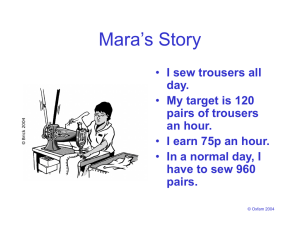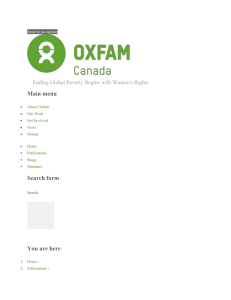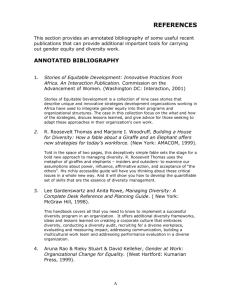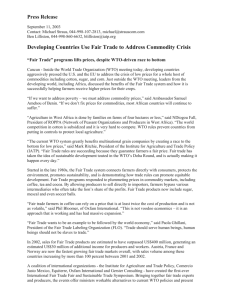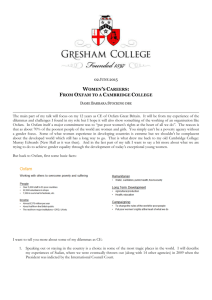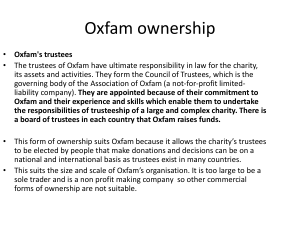THE MTF GAME TEACHER'S GUIDE
advertisement
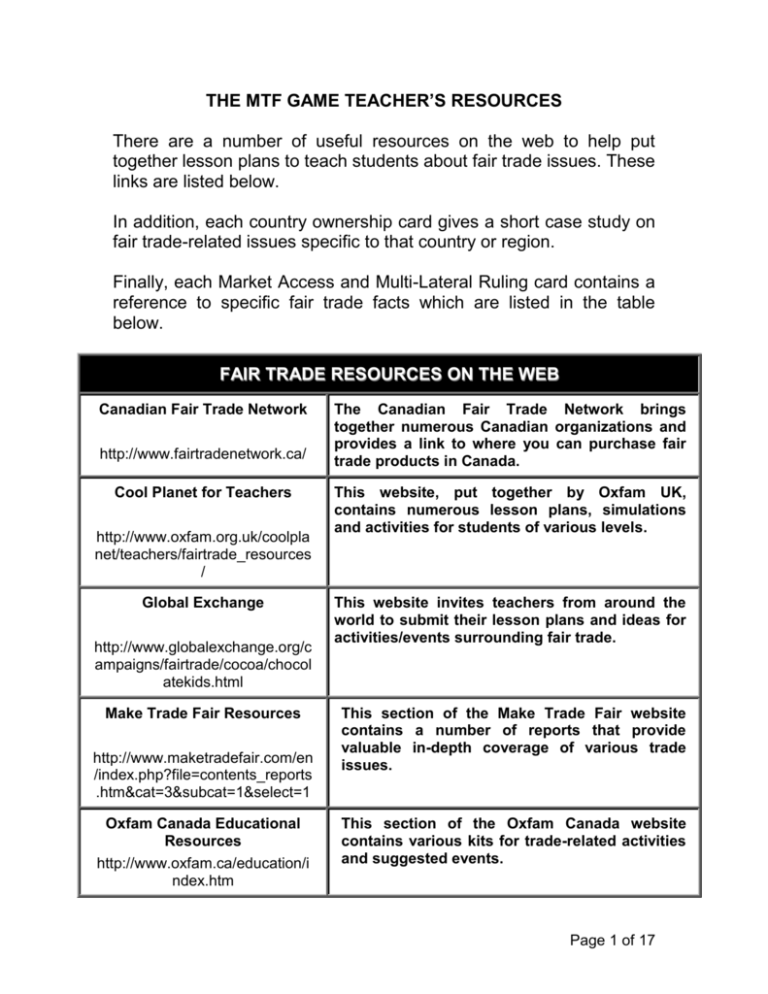
THE MTF GAME TEACHER’S RESOURCES There are a number of useful resources on the web to help put together lesson plans to teach students about fair trade issues. These links are listed below. In addition, each country ownership card gives a short case study on fair trade-related issues specific to that country or region. Finally, each Market Access and Multi-Lateral Ruling card contains a reference to specific fair trade facts which are listed in the table below. FAIR TRADE RESOURCES ON THE WEB Canadian Fair Trade Network http://www.fairtradenetwork.ca/ Cool Planet for Teachers http://www.oxfam.org.uk/coolpla net/teachers/fairtrade_resources / Global Exchange http://www.globalexchange.org/c ampaigns/fairtrade/cocoa/chocol atekids.html Make Trade Fair Resources http://www.maketradefair.com/en /index.php?file=contents_reports .htm&cat=3&subcat=1&select=1 Oxfam Canada Educational Resources http://www.oxfam.ca/education/i ndex.htm The Canadian Fair Trade Network brings together numerous Canadian organizations and provides a link to where you can purchase fair trade products in Canada. This website, put together by Oxfam UK, contains numerous lesson plans, simulations and activities for students of various levels. This website invites teachers from around the world to submit their lesson plans and ideas for activities/events surrounding fair trade. This section of the Make Trade Fair website contains a number of reports that provide valuable in-depth coverage of various trade issues. This section of the Oxfam Canada website contains various kits for trade-related activities and suggested events. Page 1 of 17 FAIR TRADE FACTS Bangladesh Country Card More than 1.5 million young women earn a living by stitching garments in factories in Bangladesh. Conditions are poor and pay is desperately low - most women earn less than US $1.50 for a day's work. In 2000 a US trade act which gives preferential treatment to poor countries became law, however, even though Bangladesh is one of the world's poorest countries, it was excluded from the act. Garment orders from US customers have since fallen by 30-40%. Canada Country Card The losses in Less Developed Country (LDC) export earnings resulting from industrialised country protectionism offset the benefits of aid flows to these countries. Trade restrictions in Canada cost LDCs approximately $1.6 billion in lost export revenue, which is around five times the level of Canadian aid flows to the LDCs. Chile Country Card The rapid growth of agricultural exports is creating new employment - and new problems across the developing world. Poor people in rural areas - women in particular - participate in the global workforce primarily as labourers for multinational companies. The potential benefits of employment are undermined by a lack of employment rights. A survey conducted among women working in the fruit-export industry in Chile found that around half of them experienced health problems linked to exposure to pesticides and toxic gases. These ranged from nausea and headaches to skin and respiratory problems. Page 2 of 17 FAIR TRADE FACTS China Country Card In China, labour law guarantees a minimum wage. However, when the Hong Kong Christian Industrial Committee conducted interviews with workers from twelve factories in Guangdong province in 2000, it found that women were being paid the minimum wage for a 40-hour week, even though they were often working for more than 50 hours. Weak employment rights and non-existent trade unions are often associated with dangerous work practices. Fires and industrial accidents are a constant feature of the special economic zones in China. Columbia Country Card Seventy per cent of Columbia's flower industry workers are women. They are given temporary contracts, often only verbal. On an average day, one woman picks around 400 carnations. The flowers from her day's work will sell on the high streets of the USA and Europe for up to $800, but she will earn a minimum wage of just under $2 a day. And it gets worse. Medical surveys show that two-thirds of Colombia's flowerworkers suffer from problems associated with pesticide exposure, ranging from nausea to miscarriages. France Country Card Throughout history, countries at the top of the technological ladder have generally sought to use intellectual-property protection to prevent others from catching up. The USA and Germany in the nineteenth century, like Korea, Taiwan, and Japan in the twentieth, were able to develop an industrial base by encouraging the copying and adaptation of imported technologies. In fact, France and several other industrialised countries did not provide standardised patent protection until after 1960. Page 3 of 17 FAIR TRADE FACTS Germany Country Card Most commodities are exported from developing countries in an unprocessed form, meaning that the value added by processing remains in industrialised countries. Developing countries account for more than 90% of cocoabean production, less than half of cocoa-butter production, one-third of cocoa powder, and 4% of chocolate. Germany grinds more cocoa than the world’s largest producer, Côte d’Ivoire. Export sales from cocoa-producing countries amount to around $2bn a year, while chocolate sales by confectionery manufacturers produce in excess of $60bn. Ghana Country Card In the mid-1970s, Ghana's rice industry supplied all the rice needed to meet national demand. It could still provide the bulk of it today. But harsh conditions imposed by the IMF and World Bank – in return for loans – allow an ever-increasing torrent of unnecessary imports. Now customers often ignore the nutritious, locally grown, brown rice in favour of the cheap bags of white rice from the USA that are stacked to the ceiling in nearby shops. US farmers receive around $232 per hectare in government subsidies. Haiti Country Card US dumping of subsidised rice on Haiti has had devastating effects on local rice producers, and gone hand in hand with rising child malnutrition. At the start of the 1980s, Haiti produced almost all of its own rice. Pressure from the international community - from the USA in particular - forced Haiti to open up its markets to foreign imports. As a result, Haiti has been flooded by cheap, subsidised rice from the USA. This has driven down the price of local rice, with appalling consequences for the people - one-fifth of Haiti's population - who rely on rice production for a living. Page 4 of 17 FAIR TRADE FACTS India Country Card In contrast to the last wave of globalisation at the end of the nineteenth century, the movement of labour is strictly controlled - at least for the poor. Skilled workers already operate in a largely borderless world. More than one-third of the work force in the US Silicone Valley originates from the Indian sub-continent. Despite remittances, which amounted to $52 billion in 1998, the costs implied by the 'brain drain' in a knowledge -based global economy are very large. India alone loses the equivalent of $700 million in revenue. Jamaica Country Card Before the early 1990s, the Jamaican dairy industry was healthy, and growing. But when the Jamaican government opened up the dairy market to imports - in response to pressure from the World Bank - that changed overnight. Shiploads of cheap milk powder from Europe, produced and exported with the aid of massive EU subsidies, spelt disaster for Jamaica's dairy farmers. Liberia Country Card In much of the developing world, resource extraction is intimately linked to conflict, environmental damage, and the violation of the rights of local populations. Large amounts of foreign investment are directed towards mineral exploitation in countries affected by ethnic strife or regional tensions. Bitter struggles for control over revenues and land have been at the heart of some of the most protracted conflicts in Liberia. Page 5 of 17 FAIR TRADE FACTS Mali Country Card In just two years (1990-1992) Mali lost around one-quarter of their total export earnings following a sharp fall in the world price of cotton. Such losses inevitably translate into acute economic pressures as governments and households seek to adjust to lower income levels by reducing consumption. In Mali, rural migrant labourers plant and pick cotton. For these labourers, changes in world-market conditions can exercise a profound influence, for better or for worse. Mozambique Country Card Europe's grossly unfair sugar trade rules reward big companies and rich farmers while costing consumers and taxpayers billions. The current system also hurts poor sugar farmers such as those on plantations and factories in Mozambique who are attempting to trade their way out of poverty. Pakistan Country Card Several industrialised countries have used their Generalised System of Preferences (GSP) to reward what they see as good labour practice. In 2001, the EU added Pakistan to the list of countries deemed eligible for tariff reductions, supposedly to reward its efforts to protect core International Labour Organization (ILO) standards. The use of GSP preferences owes more to strategic and foreign-policy considerations than to a concern to protect labour rights. In the case of Pakistan, the EU was really providing a reward for its support of the US-led coalition's war in Afghanistan. Page 6 of 17 FAIR TRADE FACTS Peru Country Card In the early 1990s, the IMF-Work Bank supported one of the world's most radical tradeliberalization programmes in Peru. The design of the reforms were heavily influenced by powerful agri-business interests. As a result, cheap wheat and rice imports have increased the price competition facing smallholder farmers who produce traditional Andean products such as quinua, beans, and potatoes. The availability of cheap alternatives to traditional foods has prompted changes in consumption patters in favour of wheat-based food and rice. Tanzania Country Card Fourteen million people die from treatable diseases every year. Many of these lives could be saved if cheap drugs were available. Global trading rules - drawn up by rich nations at the World Trade Organisation - oblige all countries to grant at least 20-year patents on new drugs manufactured by the transnational pharmaceutical companies. This will prevent poor countries like Tanzania from producing their own cheaper equivalents of those drugs, and drive medicines even further out of reach of poor people. Thailand Country Card International trade is not the primary force that drives global poverty and inequality, but it is failing the poor. Rich countries continue to capture the lion’s share of world export markets, while whole swathes of the developing world fall further behind. Within developing countries too, integration into international markets often intensifies inequality. Export growth is widening economic divisions in the ‘poverty-belt’ states of southern Thailand as well as between rural and urban areas of Thailand. Page 7 of 17 FAIR TRADE FACTS Trinidad and Tobago Country Card Bananas from Trinidad and Tobago (Windward Islands) make up less than two per cent of the world export market, which is dominated by multinational companies in Latin America. For many years the people of Trinidad and Tobago were able to make a modest but secure living from growing bananas - exporting most of them to the UK. Since the early 1990s, Europe - in response to a successful World Trade Organisation challenge by the USA and multinationals - has changed their preferential trade relationship, pitting Caribbean farmers against the might of the multinationals. Uganda Country Card In 1987, government taxation and exchange rate over-valuation meant that coffee farmers in Uganda received 10 cents for every $1 of coffee that they produced for export. That changed at the end of the 1980s, when the government of Uganda removed taxes on coffee exports, introduced market-based exchange rates, and liberalised imports of agricultural inputs such as fertiliser. Since then, coffee production has surged and despite low world prices, farm incomes have improved dramatically. United Kingdom Country Card Global integration through trade has been accompanied by increased income inequalities in industrialised countries as well. In the UK, the number of households living on belowaverage income tripled to 14 million between the mid-1970s and 1998. A survey of UK garment manufacturers found that almost half the companies covered were sub-contracting work to home-workers. More than threequarters of the home-workers interviewed in the study were being paid less than the national minimum wage. As in developing countries, the vast majority of home-workers in the UK are women. Page 8 of 17 FAIR TRADE FACTS United States Country Card The USA has developed some of the most imaginative strategies for abusing the letter and the spirit of the WTO’s anti-dumping provisions. Under legislation known as the Byrd amendment (2000), anti-dumping duties collected by customs authorities on competing imports are given to US companies that bring trade grievances to the government. US producers therefore benefit not only from the imposition of anti-dumping duties on their foreign competitors but also directly through government subsidies when those duties are disbursed. Vietnam Country Card Prawns are a luxury item in the rich world, but some of the people who farm them are barely able to make a living. Farmers have to worry about disease, water quality, and theft. Once the prawns are farmed, if world production is high, the price they fetch for their crop can drop dramatically. On top of that, the EU charges high tariffs on imported frozen prawns while at the same time giving its own fishing fleets massive subsidies to catch fish from the coastal waters of developing countries depleting fish stocks and threatening the livelihoods of thousands of fisher people. Market Access Card #1 There is a crisis destroying the livelihoods of 25 million coffee producers around the world. The price of coffee has fallen by almost 50% in the past three years to a 30-year low. Farmers sell at a heavy loss while branded coffee sells at a hefty profit. The coffee crisis has become a development disaster whose impact will be felt for a long time. Page 9 of 17 FAIR TRADE FACTS Market Access Card #2 Current approaches to patenting directly threaten the interests of small farmers. Northern governments have basically granted corporate investors the right to perform biopiracy, by allowing them to patent genetic materials taken from developing countries. If a royalty of 2% is charged on these materials, it would earn some $5 billion for the patent company. To add to their problems, smallholder farmers could lose the right to save, sell, and exchange seeds. Market Access Card #4 Millions of poor farmers in developing countries cannot earn a living because of cheap, often dumped, food imports. The situation with rice, the world’s most important basic food, shows the seriousness of the problem. Rich countries have used the IMF and World Bank, and aggressive bilateral trade deals, to push open the door of poor countries’ markets to a flood of cheap rice, including heavily subsidized rice from the US. Market Access Card #5 In many countries, rural women are among the biggest potential losers from globalization. They have less command than men over resources such as land, credit, and capital. In some cases, if a family begins to cultivate commercial crops, the gender-linked division of labour means that women lose control over the marketing of the produce. Market Access Card #6 The incoherence between industrializedcountry trade and development policies can sometimes reach absurd proportions: trade restrictions in Canada cost LDCs approximately $1.6 billion in lost export revenue, which is around five times the level of Canadian aid flows to the LDCs. Page 10 of 17 FAIR TRADE FACTS Market Access Card #7 In Canada, tariffs on processed food are as much as 13 times higher than those on unprocessed products. The situation is similar in the EU, USA and Japan. This has worked to slow or even halt the establishment of food processing businesses in developing countries thereby limiting their trade revenues. Only 5% of agricultural exports from less developed countries are high-value processed foods. In contract, 32.5% of agricultural exports from developed countries fall into this category. Market Access Card #8 In today’s globalized world, our lives are more closely linked than ever before, and so is our prosperity. As a global community, we sink or swim together. No country, however strong or wealthy, is an island. If Africa were to increase its share of world trade by 1% of world exports, the resulting $90 billion generated would be three times what the continent receives in aid and debt relief. Market Access Card #9 The Fair Trade movement has been one of the most powerful responses to the problems facing commodity producers. It gives consumers an opportunity to use their purchasing power to voice their indignation at the treatment of producers in poor countries has increased. More retailers than ever are stocking Fair Trade goods, the number of products on offer continues to grow as demand increases, and more poor communities are feeling the benefits. You CAN make a difference! Page 11 of 17 FAIR TRADE FACTS Multi-Lateral Ruling Card #1 While rich countries keep their markets closed, poor countries have been pressured by the International Monetary Fund and World Bank to open their markets at breakneck speed, often with damaging consequences for poor communities. Multi-Lateral Ruling Card #2 The WTO is made up of 148 countries that come together to decide the rules of international trade. These rules are supposed to be set through a democratic process of negotiation and consensus – but in practice rich countries gain the most from them. They use their power and influence to dominate decision making and push through policies that benefit themselves and leave millions of the world's poorest people trapped in poverty. Multi-Lateral Ruling Card #3 Africa faces severe challenges to the health of its people, including the threats posed by infectious diseases such as HIV/AIDS, malaria, and tuberculosis. The availability of cheap, generic drugs to address this health crisis is threatened by WTO patent rules, which grant monopoly power to patent owners for a minimum of 20 years. Facing no competition, companies are free to charge as much as they like for new patented products, including lifesaving medicines, even if this means that only a small minority of the population can afford them. Multi-Lateral Ruling Card #4 In 2004 the WTO recognized the need to lower agricultural export subsidies which makes rich countries' products artificially competitive and drive farmers from poor countries out of business. There is still no agreement on a timetable for this change and worse still rich countries have, in the meantime, been redefining their subsidies so that they escape any ban on dumping. Page 12 of 17 FAIR TRADE FACTS Multi-Lateral Ruling Card #5 In 1996, the Canadian government said that it would ban importation of the chemical MMT (methlcyclo-pentadienyl manganese tricarbonyl), a petroleum additive, for reasons of environmental and public health. It acted on the basis of scientific concern over the threat of air pollution. It actions were promptly contested by the Ethyl Corporation, a US company which is the only manufacturer of MMT in the world. Canada lost the case and paid Ethyl $13 million in compensation for lost profits. Multi-Lateral Ruling Card #6 The Dominican Republic-Central America Free Trade Agreement (DR-CAFTA) was passed by the US Senate in July, 2005 but faces opposition in many of the other countries involved. The agreement provides virtually no new US market access for developing countries but it does extend monopoly rights for pharmaceutical companies and prohibits governments from changing policies to ensure that investment provides maximum benefit to local communities. Multi-Lateral Ruling Card #7 The European Union’s 2001 ‘Everything But Arms’ (EBA) initiative was originally intended to provide immediate free market access for all non-military exports from Less Developed Countries (LDCs). Strong campaigning by European producers and traditional Caribbean exporters, however, resulted in the delay of free LDC market access for 3 important products (rice, sugar, and bananas) for up to 8 years. Page 13 of 17 FAIR TRADE FACTS Multi-Lateral Ruling Card #8 There are still a number of countries that are not members of the WTO and wish to join. But the WTO membership process is inherently unfair. Not only must a newly applying member follow all WTO rules, existing member countries can ask for further concessions in return for supporting the application. In its current negotiations, the country of Vanatu has been forced to give commitments to radical liberalization of services in education, hospitals, retail and wholesale distribution, environmental services and telecommunication. Multi-Lateral Ruling Card #9 Despite its democratic appearance, the power relationships and larger pool of resources that the rich countries have within the WTO create inherent inequalities. For example, in negotiations on agricultural trade, which are more important to the economies of subSaharan Africa or South Asia, one Southern non-specialist representative may face large teams of consultants, lawyers and special advisors backing American and European interests. Multi-Lateral Ruling Card – Debt Relief The Heavily Indebted Poor Countries (HIPC) initiative has delivered more than $29 billion of debt cancellation and pledged to deliver $24 billion more. However, only 7 countries have actually seen their debts brought down to levels considered ‘sustainable’, even according to the narrow criteria of the HIPC initiative. Even those countries that have qualified for debt relief are still paying $2.8 billion a year to their creditors, 15% of their revenues and in many cases more than they spend on education or health. Page 14 of 17 REFERENCES 1. Organisation for Economic Co-operation and Development (2003) QUANTITATIVE ASSESSMENT OF THE BENEFITS OF TRADE FACILITATION. http://www.olis.oecd.org/olis/2003doc.nsf/LinkTo/td-tc-wp(2003)31-final 2. Oxfam International (2002) MUGGED: Poverty in your coffee cup http://www.maketradefair.com/en/assets/english/mugged.pdf 3. Oxfam International (2002) RIGGED RULES AND DOUBLE STANDARDS: trade, globalisation, and the fight against poverty. http://www.maketradefair.com/en/index.php?file=03042002121618.htm&c at=3&subcat=2&select=1 4. Oxfam International (2002) US bullying on drug patents: One year after Doha http://www.maketradefair.com/en/assets/english/bp33_bullying.pdf 5. Oxfam International (2004) TRADING AWAY OUR RIGHTS: Women working in global supply chains. http://www.maketradefair.com/en/assets/english/taor.pdf 6. Oxfam International (2005) A ROUND FOR FREE: How rich countries are getting a free ride on agricultural subsidies at the WTO http://www.maketradefair.com/en/assets/english/aroundforfree.pdf 7. Oxfam International (2005) BLOOD ON THE FLOOR: How the rich countries have squeezed development out of the WTO Doha negotiations http://www.maketradefair.com/en/assets/english/bp82_blood.pdf 8. Oxfam International (2005) DUMPING: The Beginning of the End? http://www.maketradefair.com/en/assets/english/bp61_sugar_dumping.pdf 9. Oxfam International (2005) GREEN BUT NOT CLEAN: Why a comprehensive review of Green Box subsidies is necessary http://www.maketradefair.com/en/assets/english/greenbox.pdf Page 15 of 17 10. Oxfam International (2005) MAKING TRADE WORK FOR DEVELOPMENT IN 2005: What the EU should do http://www.maketradefair.com/en/assets/english/eu2005.pdf 11. Oxfam International (2005) MIND THE GAP: countdown to Viet Nam's accession to the WTO http://www.maketradefair.com/en/assets/english/bn_vietnam.pdf 12. Oxfam International (2005) NON-AGRICULTURAL MARKET ACCESS (NAMA) TALKS THREATEN DEVELOPMENT: Six reasons why a fundamentally different approach is needed http://www.maketradefair.com/en/assets/english/namamyths.pdf 13. Oxfam International (2005) SCALING UP AID FOR TRADE: how to support poor countries to trade their way out of poverty http://www.maketradefair.com/en/assets/english/aid_for_trade.pdf 14. Oxfam International (2005) THE FIJIAN SUGAR INDUSTRY: Investing in sustainable technology http://www.oxfam.org.uk/what_we_do/issues/trade/downloads/bp77_sugar .pdf 15. Oxfam International (2005) THE IMPACT OF THE SECOND-HAND CLOTHING TRADE ON DEVELOPING COUNTRIES http://www.maketradefair.com/en/assets/english/shc_0905.pdf 16. Oxfam International (2005) TRUTH OR CONSEQUENCES: why the EU and USA must reform their subsidies or pay the price http://www.maketradefair.com/en/assets/english/truth.pdf 17. Sandrey, R. (2000) THE RELATIVE TARIFF RATIO INDEX The NZ Trade Consortium/The NZ Institute Of Economic Research (Inc.). http://www.nzier.org.nz/SITE_Default/SITE_Publications/x-files/361.pdf 18. Shah, A. (September 26, 2002) GENETICALLY ENGINEERED FOOD: Food Patents - Stealing Indigenous Knowledge?. http://www.globalissues.org/EnvIssues/GEFood/FoodPatents.asp Page 16 of 17 19. South Centre/Oxfam International (2005) WHY DEVELOPING COUNTRIES NEED TARIFFS: How WTO NAMA negotiations could deny developing countries’ right to a future. http://www.maketradefair.com/en/assets/english/sctadp.pdf Page 17 of 17

